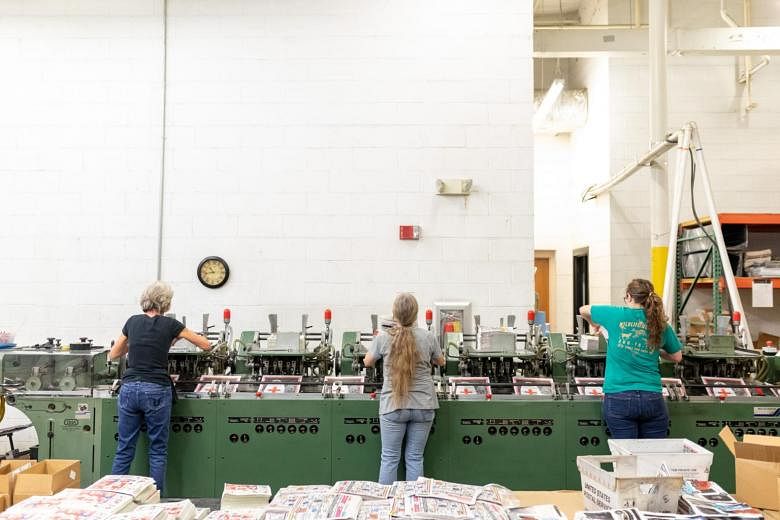CORNELIA, GEORGIA (NYTIMES) - When a sport utility vehicle swerved out of its lane several weeks ago, slamming into a pickup truck and killing a teenager, a reporter from The Northeast Georgian raced to the scene. Within hours, the paper had posted the news on Facebook and updated it twice. It was shared by hundreds of people on the social network.
The fatal wreck consumed the town of Cornelia, nestled near the Chattahoochee National Forest about 145km north-east of Atlanta.
The Northeast Georgian was the first to report the news, but unless the people who shared its story on Facebook follow a link to its website, either to see an ad or to subscribe to its twice-weekly print edition, the paper won't get paid.
As with many small papers across the United States, that business strategy is not working for The Northeast Georgian. The paper's five employees do not just report and write. They also edit the articles, take photographs and lay out the newspaper.
"My grandmother used to say, 'Honey, if you let them get milk through the fence, they'll never buy the cow'," said Mr Dink NeSmith, chief executive of Community Newspapers Inc, which owns The Northeast Georgian and 23 other local papers.
But the tough economics facing small newspapers like Mr NeSmith's has generated rare bipartisan agreement in Washington.
Anger towards big technology companies has led to multiple antitrust investigations, calls for a new federal data privacy law and criticism of the companies' political ad policies. Perhaps no issue about the tech companies, though, has united lawmakers in the Capitol like the decimation of local news.
Lawmakers from both parties blame companies like Facebook and Google, which dominate the online ad industry.
Senator Mitch McConnell, the majority leader, gave a big boost last week to a Bill that may provide some papers a lifeboat.
The proposal would give news organisations an exemption from antitrust laws, allowing them to band together to negotiate with Google and Facebook over how their articles and photos are used online, and what payments the newspapers get from the tech companies. The Bill is backed by the News Media Alliance, a trade group that represents news organisations including The New York Times Co.
The proposal was written by Representative Doug Collins, a conservative whose district includes Cornelia, and Representative David Cicilline, a liberal.
Several prominent sponsors have signed on to an identical version in the Senate. They include Democrats like Mr Cory Booker of New Jersey and Ms Amy Klobuchar of Minnesota, and Republicans Rand Paul of Kentucky and John Kennedy of Louisiana.
For the politicians, the issue is personal. They see news deserts in places where one or two local newspapers used to track their campaigns and official actions, keep local police departments and school boards accountable, and stitch together communities with big layouts on Main Street holiday parades and high school sports stars.
"I am a free-markets guy and have fought against the idea that just because something is big, it is necessarily bad," Mr Collins said.
"But look, I'm a politician and live with the media and see its importance. These big, disruptive platforms are making money off creators of content disproportionately."
Facebook and Google declined to comment about the legislation. Representatives of the companies say their businesses have spent hundreds of millions of dollars on programmes to bolster local journalism. The companies also work with news organisations to promote their articles and videos, driving traffic to their websites.
Facebook recently announced partnerships with major news organisations, including The New York Times, The Wall Street Journal and CNN, that would give publishers a bigger cut of advertising revenue generated from their journalism.
"We know this is a challenging time for journalism," Mr Campbell Brown, Facebook's vice-president of global news partnerships, said in a statement. "And we are working closely with publishers to find new ways to address those challenges."
A Google spokesman said: "Every month, Google News and Google Search drive over 24 billion visits to publishers' websites, which drive subscriptions and significant ad revenue."
Newspapers have faced devastating financial losses for years. One in five newspapers has closed since 2004 in the US, and about half of the nation's more than 3,000 counties have only one newspaper, many of them printing weekly, according to a report by the University of North Carolina published in late 2018. In the last year alone, Facebook and Google added tens of thousands of employees and reported billions of dollars in profits.
The proposed antitrust exemption for news organisations still faces hurdles. Congress passed few Bills of note in 2019 - and it may pass even fewer this year, in the face of impeachment and the November election. Conservative think tanks and some consumer groups are pushing back on the Bill, wary of giving any antitrust exemptions to businesses.
"Instead of trying to innovate and find solutions that way," said Mr Neil Chilson, a senior research fellow for technology and innovation at the Charles Koch Institute, "they are trying to make better deals with people with more money, and that doesn't solve their basic business-model problems."

